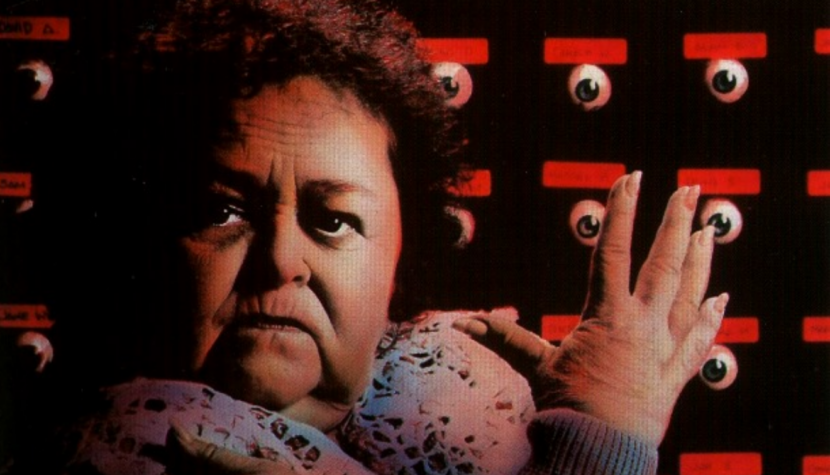ANGUISH. Frightening power of the cinematic medium

I’ve loved the cinema for as long as I can remember. And in this case, I’m not talking about the art of film, but the very building itself, especially the movie theater, where I comfortably settle into a seat, waiting for the black screen to illuminate and reveal its treasures. Today, when multiplexes largely shape the cinematic education of viewers, where all the theaters look the same, and before the screening starts, we have to endure twenty minutes of various commercials, the magic of the big screen has somewhat faded. Of course, small, old cinemas still exist, and it’s worth, even necessary, to visit them, to buy tickets there and watch movies – the experience is often entirely different because the atmosphere, appearance, and scent are different. Ultimately, it all comes down to one thing – when the lights go out, and the screening begins, our world disappears, and we become participants in another reality. The better the film, the stronger the illusion. But what to do when what happens on the screen begins to speak to us in an unexpected and frightening way?
Bigas Luna’s Anguish surprisingly becomes an illustration of our concerns and fears about what lurks in moving images, prompting us to reflect on the power of the cinematic medium.
Here, we witness the story of John Pressman (played by one of the most distinctive American supporting actors, Michael Lerner), an apparently benevolent ophthalmologist who lives with his mother (played by the famous Zelda Rubinstein), amidst a countless number of snails and birds. Eccentrics? Most likely, but when, in one of the scenes, an elderly lady at home holds a large seashell to her ear and hears a conversation between John’s dissatisfied client and a nurse, a conversation taking place in his office, we know that we are entering the realm of fantasy and horror. Later, the mother hypnotizes her son to kill the aforementioned client and gouge out her eyes. We observe this not overly bloody, though distasteful scene, only to suddenly realize that we are not alone in this – it turns out that the Pressman’s story is a film being watched in a cinema (aptly titled Mommy), and the audience reacts exceptionally strongly to it. To the extent that soon, the on-screen reality finds its reflection in the real world.

Luna employs the formula of a film within a film to equally examine the mechanisms governing the collective consciousness of viewers and to play with the visual delight of overlapping two, and perhaps even three worlds. The horror plot, at a certain point, becomes a kind of joke on the viewers (both in Anguish and us) when John decides to hunt for more victims in the cinema. Luna achieves an extraordinary schizoid effect, scaring the audience with a sense of threat arising solely from the fact that they are in the same situation as the characters in Mommy. An additional layer of this twisted and sinister game could be felt by watching Anguish in the cinema, which should raise the question for the more sensitive individuals – is anyone watching them too? Are we not, in reality, trapped in a spiral that, by revolving, resembles an endless and living structure?

The character who experiences the screening most intensely is the teenage Patty, who not only cries and trembles with fear but also hears and sees things as if transferred from the screen into the real world. Her afternoon trip to the cinema becomes an exceptionally unpleasant, even traumatic experience. What’s most intriguing is that at a certain point, she starts rubbing her eyes as if they were hurting. Why? Could it be that low-quality films affect the viewer this way? Because, let’s not kid ourselves, Mommy doesn’t look like one of the best achievements of world cinema, but it would probably be the first case where the director’s vision translates into a deterioration of the viewer’s eyesight. Or maybe it has something to do with the warning at the beginning of the film about subliminal messages contained in the image and hypnosis, which would explain the very vivid reception among the audience.

There’s also a chance that the girl’s eyes hurt when she sees suggestive scenes of their removal by the main character. This motif seems to dominate the film – Pressman is a serial killer who deprives his victims of their eyes and then collects them. His mother at one point says, “All the eyes in this city will be ours,” which can be understood both literally and metaphorically. Isn’t that the goal of every filmmaker, to have as many people as possible watch their work? Aren’t our eyes the target of all directors in the world?
Bigas Luna uses the horror genre to dress his observations about the nature of cinema, and indeed, the conclusion can be truly frightening – we have no control over the wonders of the cinematic screen, but what pours out of it can stay with us, even if we don’t want it to. Anguish has a peculiar plot, rhythm, and a mood reminiscent of a nightmare, yet at the same time, it’s impossible to deny its exceptionally dark sense of humor. The scenes in which the character played by Lerner quietly murders unsuspecting viewers portray their vulnerability and an evident surrender to the magic of cinema. Indeed, viewers seem to be in a hypnotic state, not even realizing that death is lurking right behind them.

But more than three decades after the Spanish director’s film was released, it’s challenging to view it merely as an example of a well-thought-out play infused with philosophical reflections. In recent years, we’ve heard multiple times about screenings that ended in tragedy when an armed lunatic started shooting at the audience. Such deaths seem unnatural, taking advantage of a situation where we are at our most vulnerable, disconnected from the real world. Cinema will never torment us in the same way that reality does.

